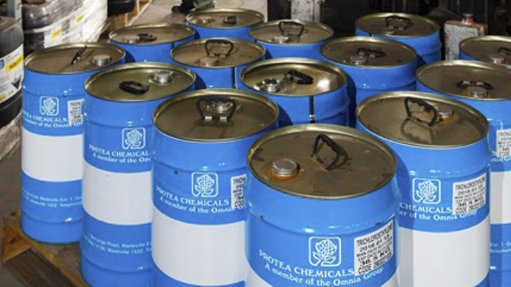
PROTEA CHEMICALS The installation project is the result of a long-standing working relationship between Astore Keymak and Protea Chemicals
Thermoplastic products supplier Astore Keymak – formerly Astore Africa – supplied and delivered several polymer plastic products to assist with the installation of a conveyance system at Omnia Group’s chemical subsidiary Protea Chemicals’ plant, in Wadeville.
The project, a result of a long-standing working relationship between Astore Keymak and Protea Chemicals, is expected to be completed at the end of this month. It is part of Protea’s R23-million acid bottle plant which started in July 2015. However, the installation of the pipe system started only in March last year.
“Astore Keymak – the sole South African distributor of quality thermoplastic valves and fittings – supplied several FIP valves, Austrian-made AGRU fittings, pipes and sheets, as well as semifinished products. The cost of products supplied for this project is between R3.5-million and R4.5-million,” says Astore MD Pranesh Maniraj.
Other notable Astore Keymak projects include the supply of products to primary producer of platinum, Lonmin, which concluded in October last year and necessitated the delivery of polypropylene and polyvinylidene-flouride pipes and fittings to convey abrasive slurries for minerals processing purposes. The company is also supplying polyethylene (PE) sheeting to the Midmar water treatment works, in KwaZulu-Natal.
Key Product for Chemicals Sector
Maniraj highlights that the AGRU PE 100 pipe system is one of the key products for the chemicals sector and is frequently used in fire protection systems.
“The pipes have a chemical resistance against inorganic and organic acids, salts and substances, with a pH level of 12 or higher. The range has two designs for different pressure ratings, SDR 13.6 and SDR 11 which are standard pressure ratings for fire protection systems,” he explains.
Maniraj also mentions that the PE resin pipes are lightweight, flexible, environment-friendly and have been tested under extreme conditions. The pipes supplied by AGRU are also certified by commercial and industrial property insurance and risk management giant FM Global.
Company and Chemicals Outlook
Maniraj notes that, for the next two to three months, the company will focus on consolidating the Astore Africa and Keymak brands into one consolidated brand, Astore Keymak, prior to the official rebranding launch during the first quarter of 2017.
He adds that the company will launch several new products throughout this year and continue its current business relations. Further, it has secured a supply agreement with State-owned power utility Eskom and expects to continue supplying its products to other State-owned utilities, specifically water and water- treatment facilities.
Maniraj stresses that Astore, unlike other players in the chemicals sector, has a strong focus on providing quality products consistently, and can support this with professional technical support and advice, which have been the basis of the company’s success.
“You’ll find that some fittings suppliers consider only their bottom line, with little to no sense of responsibility. These types of suppliers aren’t as prevalent or as successful in the chemicals sector, simply because a leakage at a chemi- cals plant or manufacturing facility creates a national outcry, owing to the nature of the substances involved, but they are still around.”
Maniraj expects the company to continue securing work in the chemicals and petrochemicals sector, specifi- cally because its brands have highly specialised products for the diverse and specifications- driven chemicals sector.
In terms of trends, he believes that polymer resins and thermoplastics will become more popular, as plastics are inert to most acids, and other abrasive and corrosive substances. Further, they tend to be more cost effective than conventional materials.
This, he explains, also forms part of the shift towards using environment-friendly products, noting that the chemicals and petrochemicals sectors particularly are under constant scrutiny regarding their carbon footprint, and plastics are easily recyclable.
Maniraj notes that the chemicals sector was especially subdued in 2016, largely because of the sector’s reliance on the oil price, which showed sustained weakness throughout the year. “A lot of the companies reined in spending and focused only on maintenance that was essential to sustaining operations.”
However, he expects the number of available projects to increase, with an expectation of renewed capital expenditure in local projects as a result of the oil price’s recovery, and the forecast that the global economy – while still largely unpredictable – will likely improve.